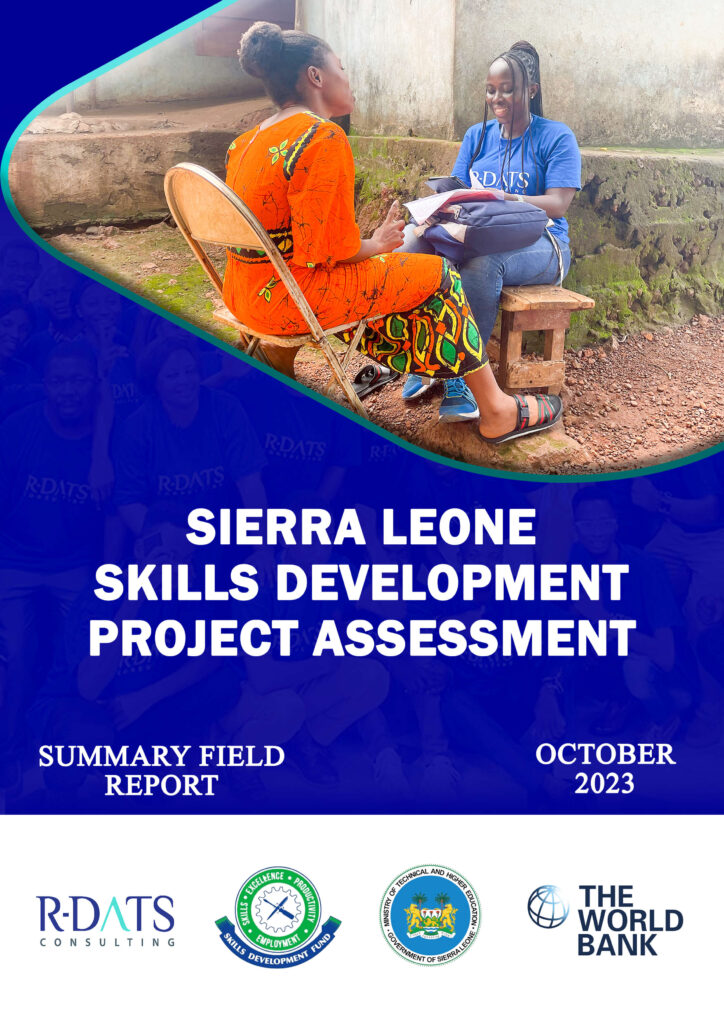Sierra Leone Skills Development Project Skills Assessment
The Sierra Leone Skills Development Project (P163723) is financed by the World Bank in the amount of US$20 million and the project is implemented by the Ministry of Technical and Higher Education (MTHE), Sierra Leone. The Project Development Objective (PDO) is to increase access to demand-led skills training and build the foundations for a demand-led skills development system in Sierra Leone.
The Project, the Skills Development Fund (SDF), aims at providing demand-led skills training/upgrading in TVET programs in six productive sectors, including agriculture, construction, fisheries, mining, tourism and ICT. The SDF training was delivered through two windows. Window 1 supports the improvement of the quality and relevance of formal (window 1, tier 1) and non-formal (window 1, tier 2) Technical Vocational Education and Training (TVET). The target is formal and non-formal training institutions introducing new short-term courses for out-of-school, unemployed and underemployed youth, with focus on girls.
Window 2 supports businesses that need to address the skills gaps to expand their production and markets and upgrade their production process to climb higher up in the value chain.
The Skills assessment is designed to evaluate the program’s effectiveness on alumni’s skills (cognitive, socioemotional, digital, and job-specific), employability, and income generation. The assessment also provides information on how existing vocational training institutions or programs are catering to the jobs and skills needs.
R-DATS’ roles and responsibilities
R-DATS Consulting was contracted by the World Bank to deliver a national large-scale household-based TVET alumni tracer survey. A total of 2,268 alumni (including alumni with disabilities) were covered during the tracer survey. In addition, an institutional survey was also conducted with 47 heads of TVET Institutes and supported 100 business owners by the intervention.
Specifically, R-DATS responsibilities include to:
- Collect lists of recent alumni from 120 designated TVET programmes.
- Prepare a complete roster of potential survey respondents (TVET alumni) based on the alumni lists received from the implementing government agency.
- Secure authorization letter for the study.
- Programme TVET alumni and institutional survey instruments using SurveyCTO software.
- Translate study surveys into local languages.
- Field test/pilot test interview guide and survey instrument.
- Organize and lead the training of enumerators for the exercise.
- Provide logistical and administrative support to survey teams during fieldwork, including any transportation, communication allowance, internet connection, etc., as necessary.
- Conduct and deliver an alumni-based survey of 2,286 TVET graduates (inclusive of 100 disabled graduates) from 120 programs across the country;
- Conduct and deliver TVET institution surveys across over 47 training/TVET institutes and 100 supported businesses by the intervention.
- Deliver a validated and adequately formatted microdata set and cleaned dataset;
- Deliver a codebook based on the questionnaire developed in consultation with the World Bank.
- Conduct survey sampling using the sample frame and estimate sample weights for the surveys.
- Analyze data and submit reports to World Bank.
R-DATS Achievements
On this assignment, we deployed our expertise and experience in developing, translating, and programming high quality questionnaires, bench tested, and conducted a pilot exercise that framed the final data collection tool. We utilized our proficiency in survey programming and statistical software such as SurveyCTO to ensure that all the data collected were of the highest quality. Data were collected using Computer-Assisted Personal Interviewing (CAPI) and accurate GPS locations of places visited by enumerators were captured and integrated with the survey data.
In summary, deliverables completed on this assignment by R-DATS include:
- Training manual and alumni roster.
- Survey programming of all the four data collection instruments approved for the study using Survey CTO.
- Inputs into the questionnaire and submission of final questionnaires and codebooks for the survey.
- Secured authorization letter for the study in Sierra Leone.
- Organized and led the training of enumerators for the exercise.
- Final cleaned micro data and final data submission including cleaning of data.
- A summary report of the data collection including estimation of samples weights and analysis of key study findings using Stata.
OVERVIEW
Partner:
The World Bank
Sector:
Education, Skills Development
Themes:
Skills Acquisition, Vocational Training and Technical Education
Country:
Sierra Leone
Study type/method:
Quantitative research, national household survey, institutional survey, and tracer survey.
Implementation period:
2023
Sample Size:
2,168 Training Alumni for National Household Tracer Survey (without disabilities)
100 disabled training Alumni for National Household Tracer Survey
47 Heads of TVET institutions (grantees)
100 owners of registered businesses (grantees)
Implementation status:
Completed
